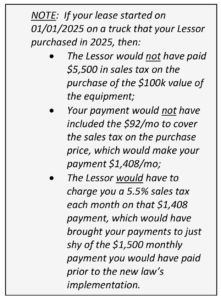MMTA has received a number of questions about the implementation and practical impacts of Maine’s new law (as of January 1, 2025) that changes the tax on leased equipment from an up-front USE/SALES tax to a tax on the rental/lease stream.
For reference, we published an article in May explaining the changes, which can be found HERE. But for those who are leasing equipment and saw 5.5% added to your January invoice, this article is intended to provide you additional information to help you navigate the inevitable conversations between Lessees and Lessors. We realize it can be confusing so we would recommend you reaching out to Tim or Brian if you have specific questions.
THE EXAMPLE:
In an effort to over-simplify the current situation, let’s say your monthly lease payment is $1,500/mo on a 5-year lease that started in 2024 and the lessor is figuring, say, $92 of your monthly payment goes to offset the sales tax they paid on the truck they are leasing to you. If their truck cost them $100k when they bought it in 2024 then they paid $5,500 in sales tax and they plan to have that amount covered in your monthly lease payments.
Beginning 01/01/2025, your monthly payment went to $1,582.50 per month because the new Maine law requires sales tax to be paid on each monthly lease payment, even though Maine already collected the $5,500 in sales tax when your Lessor bought the equipment in 2024.
 To recognize this transition, the new law has a reimbursement provision that allows Lessors to get back up to two years of monthly sales tax payments on equipment whose lease started prior to 01/01/2025 (and the Lessor paid the full sales tax when they bought it) and continued under an existing lease in 2025 and 2026. This reimbursement is limited to the sales tax paid on this equipment in 2025 and 2026 and it is not a complete reimbursement for the tax paid on the purchase price of the equipment prior to 01/01/2025.
To recognize this transition, the new law has a reimbursement provision that allows Lessors to get back up to two years of monthly sales tax payments on equipment whose lease started prior to 01/01/2025 (and the Lessor paid the full sales tax when they bought it) and continued under an existing lease in 2025 and 2026. This reimbursement is limited to the sales tax paid on this equipment in 2025 and 2026 and it is not a complete reimbursement for the tax paid on the purchase price of the equipment prior to 01/01/2025.
We see this reimbursement mechanism as a key to the Lessor/Lessee conversations under this new Maine law. One solution might be to re-negotiate existing leases to start after 01/01/2025, but then Lessor’s would have significant stranded costs creating an unfair burden on them. But on the other hand, if the Lessee is saddled with the additional 5.5% on their monthly bills that already include a sales tax component, that doesn’t strike us as fair to the Lessee to bear the added cost. As we see it, the key to this arithmetic is to decide who will benefit from the reimbursements when they are realized in 2027 – the Lessor, who has already covered their sales tax burden through the lease payments, or the Lessee who has effectively been paying for the sales tax on the equipment twice since January 2025.
Which is all to say that MMTA does not want to get in the middle of the Lessee/Lessor relationship and we are not offering legal or financial advice. But we feel it is important to point out some of the practical realities with the implementation of this new law, which is the purpose of this article. Again, we realize it can be confusing so we would recommend you reaching out to Tim or Brian if you have specific questions.
